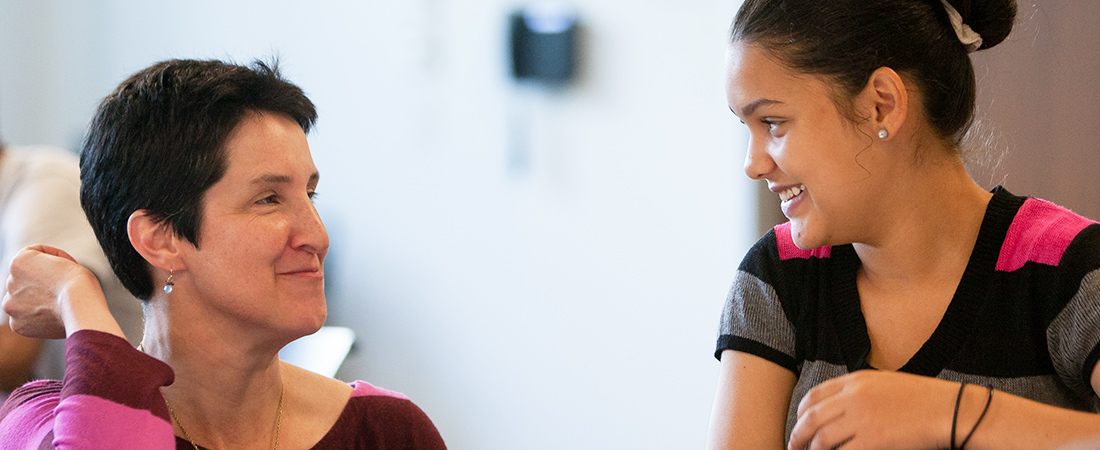A New Angle on Mathematics

EDC’s Eden Badertscher works on issues of equity in mathematics education.
An eighth-grade algebra teacher in Pittsburgh for 14 years, Rosemary Schmitt is used to seeing some blank stares when she diagrams a new algebra concept. It’s par for the course with middle schoolers. But over the past few years, Schmitt became concerned with a pattern she saw emerging in her classes: African American and other minority students seemed less engaged than their white classmates.
This troubled her. She genuinely cared about her students, and she thought she treated everyone equally. Why wasn’t she reaching all of them?
EDC’s Eden Badertscher says that the answer to Schmitt’s question lies in a complicated tangle of issues—including race, class, and educational equity—that make many students tune out from mathematics before they even pick up a protractor.
“There’s an insidious cultural narrative that African American and Latino students are no good at math,” explains Badertscher. “Standardized test results and the underrepresentation of African Americans and Latinos in STEM fields fuel this perspective. As a result, many kids grow up thinking that mathematics is not for them, and every struggle they have with the subject just confirms that belief.”
A former teacher and math supervisor, Badertscher has seen many young minds turned off from mathematics for reasons more sociological than academic. Now, she is trying to interrupt this cycle. In summer 2014, she launched an effort to bring together mathematicians and teachers—including Schmitt—to talk about how power and privilege impact students’ mathematical experiences in the Pittsburgh Public Schools.
Called Designing for Equity by Thinking in and about Mathematics (DEbT-M), the program is funded by the National Science Foundation. EDC is also partnering with the Pittsburgh Public Schools, Carnegie Mellon University, the University of Pittsburgh, and Duquesne University for this work.
An educational debt
The acronym DEbT-M was inspired by noted education professor Gloria Ladson-Billings, says Badertscher.
“Ladson-Billings has said that we don’t have an achievement gap, but that we owe our students an educational debt,” she says. “The acronym was chosen to emphasize this as our perspective.”
As part of DEbT-M, teachers participate in extensive professional development over the course of two summers. During the following school years, a series of seminars, study groups, and workshops help teachers to continue reflecting on how to improve outcomes for all students, regardless of race.
In one DEbT-M workshop, Badertscher leads a discussion about how institutionalized racism has impacted the mathematics education of generations—and how that legacy continues to impact students today. Teachers share their own experiences with prejudice and talk about how hidden biases may be creeping into their practice.
But there’s a heavy dose of mathematics, too. After the discussion about equity, Badertscher introduces teachers to the ancient Egyptian number system, which used hieroglyphs instead of Arabic numerals. Then she gives teachers a task: figure out how the ancient Egyptians carried out simple arithmetic.
The room goes quiet as teachers struggle to make sense of the new system. This, according to Badertscher, is part of the point.
“We’re trying to counter the perceptions that only a few smart, old, white people can do math,” she says. “Math is a human activity. And struggle in math is normal, too.”
Making a connection
If struggle is normal, then support is also essential. That’s why Badertscher emphasizes the importance of relationship building during the DEbT-M workshops. She says that if teachers expect students to persevere through difficult mathematical topics, then they have to help those students feel like they have someone in their corner.
Though this is important for all students, it is especially critical for students of color.
“If a teacher builds a productive relationship with a student, then what that teacher thinks will make a difference that can help counter whatever society at large thinks,” says Badertscher.
According to Schmitt, the workshops have made her think differently about mathematics, education, and her own relationships with students. When she signed up for DEbT-M, she was looking for a “bag of tricks” she could use to engage the students she wasn’t reaching. She soon learned it was not that simple.
“I found out that I needed to build deeper relationships with all of my students,” she says.
Schmitt adds that DEbT-M also gave her tools for rethinking her approach to teaching. Before joining the community of practice, Schmitt says, she thought all students approached problems in the same way, and she didn’t think much about how culture impacted their mathematical thinking. Now, drawing on the conversations and experiences she has had through DEbT-M, she encourages her students to offer alternative ways of thinking about the mathematics problem at hand, even if their logic doesn’t immediately make sense to her.
“I realized that I needed to allow kids to buy into problems on their own terms,” she says.
All of these changes have added up to something big: her students seem much more willing to engage in their classwork.
“They really do feel like they are a community in this classroom,” she says. “It takes time, but I think this approach makes a difference.”
